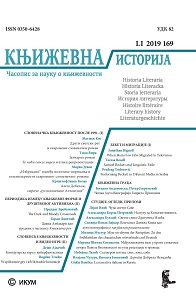Јанчаров роман Те ноћи сам је видео и етика репрезентације
Jančar’s Novel I Saw Her That Night and the Ethics of Representation
Author(s): Tomo VirkSubject(s): Slovenian Literature
Published by: Институт за књижевност и уметност
Keywords: Drago Jančar;Alojzija Zupan Sosič;novel;representation;ethics;ideology;Second World War;
Summary/Abstract: The article discusses the novel I Saw Her That Night, written by the prominent Slovene writer Drago Jančar. The plot of the novel is based on the documentary reports about the brutal execution of the spouses Hribar in January 1944. The Hribars were killed by the communist intelligence service and recently rehabilitated. Jančar’s novel is built against the background of WWII, yet the main focus remains on the personal fate of Hribar’s wife (her fictional name is Veronika). She is depicted (in tune with the documentary records) as an emancipated, attractive, rich young woman with a strong desire for an intensive life. The same personal qualities that make her attractive also prove to be fatal for her and her husband in the circumstances of the cruel war. The simultaneity of the liberation struggle, revolution, and civil war in Slovenia during WWII are still subject to conflicting interpretations and ideological appropriations, yet Jančar with his novel doesn’t want to enter into this dispute. He is interested in a personal tragedy caused by the larger, unavoidable, unforeseeable, unmanageable fatal circumstances. In order to avoid the ideological commentary, he chooses five personal narrators (Veronika’s voice, her point of view, is absent), all of the parts of the heroine’s life, who give their own accounts about Veronika’s life and about what happened to her. In this way, we are faced with a polyvocal, “Rashomonic” structure that avoids authorial, authoritative voice and offers various perspectives instead. This enables Jančar to represent the unrepresentable. The article juxtaposes this kind of artistic representation to the ideological approach, exemplified by A. Zupan Sosič’s reading of Jančar’s novel. Such a reading remains on the level of a pre-established perspective and remains unsusceptible to the advantages of artistic representation and to the ethical potential of literature.
Journal: Књижевна историја
- Issue Year: 51/2019
- Issue No: 169
- Page Range: 31-51
- Page Count: 21
- Language: Serbian

